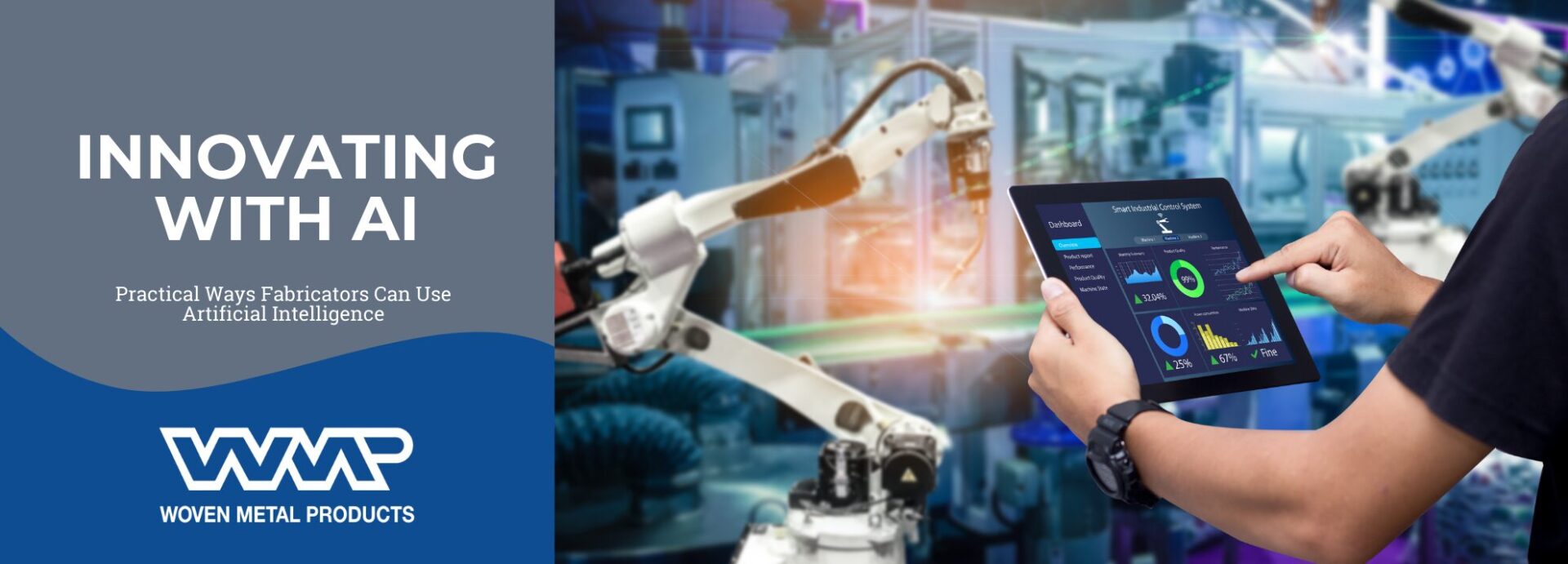By Beno Konaraki, VP of Production for WMP, and David Quinn, VP of Operations for WMP
One of the hottest topics across all industries is using artificial intelligence (AI) to innovate, streamline procedures and maximize efficiency. And studies show that manufacturers and fabricators, such as Woven Metal Products (WMP), are ahead of the curve over several industries in using AI.
A 2021 study by KPMG found that manufacturing was far ahead of other industries in using AI with 93% of manufacturing businesses saying AI was moderately or fully functional in at least one system. For comparison, the next highest level of adoption was at 84% by the financial services industry.
At WMP, we’re always looking for ways to improve our technology, services and products, and our team has been incorporating AI tools like ChatGPT and Microsoft Excel’s Data Analysis into our workflow in some simple, yet potentially surprising ways — with positive results.
We’ve found that AI’s ability to deliver immediate results in a data-driven company like ours is remarkable. Read on for five ways the fabrication industry can use AI to enhance their work based on our team’s experience.
1. Production Optimization
By incorporating more data in ways that we may not have thought to previously compare, we can look at efficiencies in new ways.
Production managers can use AI to allocate team member hours to different resources more efficiently, aligning them with various key performance indicators. AI can consider factors like equipment usage efficiency, workforce skill levels and project deadlines to create these plans.
We’ve seen these tools also lead to more effective use of resources, quicker production cycles, and lower operational costs. Another positive: AI tools can help create more balanced workloads and set realistic expectations, which can boost employee morale and satisfaction.
2. Creating Preliminary Welding Procedure Specifications (PWPS)
Fabricators know the importance of developing precise PWPS to achieve quality welds that meet all code requirements. With all the intricate steps and settings that must be included in a PWPS, from gas and flow rate to materials and optimal weld positioning, creating a PWPS from scratch can be daunting.
We’ve been able to augment this process with AI through advanced machine learning techniques. Using this technology, fabricators can sift through an extensive database of welding procedures and their outcomes to develop their own high quality PWPS that comply with industry standards. It’s not only a faster process, but it also minimizes human error.
3. Material Estimation for Projects
Fabricators’ ears will perk up if they hear about a new way to minimize waste. That’s how our team feels about using AI to help us estimate the needed materials for a project. Since many of our customers’ products involve proprietary technology and designs, the ability to tailor what’s needed for their specific project is very important to our shop.
By analyzing project designs and historical data, AI can accurately predict the quantity of materials required and assist with the layout of a project — maximizing the surface area used and minimizing waste. This leads to more accurate budgeting and material procurement, reducing the risk of shortages or excess. It also helps us plan and allocate resources, ensuring our projects are completed efficiently and cost-effectively.
4. Design for Shipping Optimization
For most of the products our team fabricates, we custom-create shipping containers for safe and secure transport. Our team takes pride in perfectly matching each product part to its specific container, so we can ensure product quality all the way to delivery.
AI is helping us maximize time and materials, as we’re using it to design the shipping containers for the best configuration for packing specific products. These tools can consider the dimensions and weight of the products, as well as the capacity of the shipping containers, and recommend the optimal design for our team to construct. This approach gives us a more efficient shipping container, which can reduce transportation costs and environmental impact.
5. Team Member Growth and Development
A fabrication shop is only as good as the team members behind it. To that end, it’s important to offer continuing training and upskilling, so your people can keep improving.
Our management team is using AI to help our team members in their career path development, using AI tools to analyze job descriptions alongside data from annual performance reviews. This involves assessing their skills, responsibilities and performance metrics, so we can map out potential career paths, as well as training and skills gaps. Team members appreciate the clear, personalized career progression plans, and our management team appreciates the enhanced motivation and employee retention.
It’s exciting to see all the positive ways AI is transforming our industry. For our team, we’re using AI tools to augment — not replace — the human element of our work. We’ve welcomed this innovation and technological leap into our fabrication shop and will continue to evolve our workflow as new tools and technology become available.
Learn more about our team and approach here: https://wovenmetal.com/about/.

